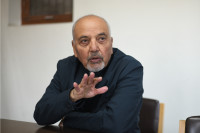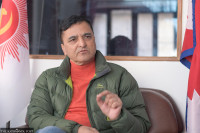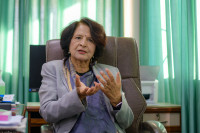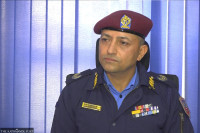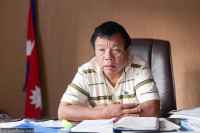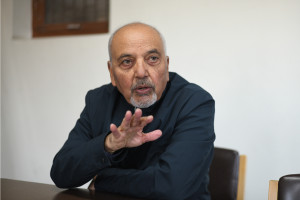Interviews
Parties now see victims as main stakeholders in settling war-era cases
The formation of the Truth and Reconciliation Commission (TRC) in 2015, eight years after the signing of the Comprehensive Peace Agreement (CPA), marked an important milestone in Nepal’s peace process.-co.jpg&w=900&height=601)
Dewan Rai & Akhilesh Upadhyay
The formation of the Truth and Reconciliation Commission (TRC) in 2015, eight years after the signing of the Comprehensive Peace Agreement (CPA), marked an important milestone in Nepal’s peace process. Last week, the Nepali Congress and the Maoist Centre, once major wartime opponents, formed a ruling coalition. Both the parties insist that putting an end to transitional justice issues will be their major priority, alongside settling disputes with the Madhesi parties. In his interview with Akhilesh Upadhyay and Dewan Rai, Chairman of the TRC Surya Kiran Gurung argued that the major political parties have now come around to the idea that all war-era cases cannot be pursued, but action needs to be taken against perpetrators of ‘grave human rights violations’ in order to give closure to outstanding wartime records. Gurung also argued that victims should be the primary stakeholders in the search for long-term peace in a post-conflict society.
How do you view the current status of the TRC?
I am happy with the journey we have made so far. In the initial stage, the conflict victims were sceptical about the commission. We have managed to allay their suspicions to a large extent, and thousands of victims have registered their cases with us. Other stakeholders, who were under the impression that the commission’s job was only to bring about reconciliation and provide compensation to the victims but not to prosecute, have come to realise that the commission will recommend actions against serious rights violators. The international community, which did not have much trust in the commission, has now started asking for relevant amendments to the TRC Act—in accordance with the Supreme Court’s decision. We forwarded those demands to the committees of the Legislature-Parliament on December 16, 2015. We are confident that if those amendments are made, the international community will cooperate with us. I feel we are on the right track to bring this issue to a close.
What kind of amendments do you think would be fruitful?
According to the SC verdict, amnesty cannot be provided in every case and action needs to be taken against perpetrators of grave human rights violations. Rape and sexual violence play no part in war; they do not influence the outcome of war in any way. They are simply criminal acts and we cannot build a healthy society without taking action against perpetrators of such crimes. People do die in wars but action needs be taken against perpetrators of torture or killings of prisoners of war.
We also want amendment in the TRC Act. Of the nine ‘gross violations of human rights’ mentioned in the Act, eight are within the TRC’s jurisdiction. Torture is one of them. However, laws criminalising it are yet to be passed. Another problem in the Act is the phrase “serious crime”, since there is no explanation as to what kind of crimes constitute it. Without clarity on this, it is difficult for the TRC to do its job.
Similarly, rape cases need to be reported within 35 days, which has been extended to six months by the SC, but that does not help as the TRC was formed almost nine years after the CPA was signed. Without getting rid of this provision, we will not be able to prosecute the perpetrators of rape and sexual violence.
There is a provision of a special court for cases we recommend for prosecution after our investigation. However, such a court is yet to be established. We have asked that it be established as soon as possible.
The Maoist Centre and the Nepali Congress, the current coalition partners, were on the opposite sides during the conflict. Now that they are in the government together, what could be the middle ground in addressing serious human rights violations during the war?
It is very important that we make a distinction between cases that took place in accordance with the principles of war and those that were entirely criminal in nature. The transitional justice laws we have in place are incomplete; there are many contradictions. For example, although we are called the Truth and Reconciliation Commission, there is little room for reconciliation. Cases of destruction of public property have also been categorised under serious human rights violations. This will not help settle the conflict. Cases without any physical harm, such as confiscation of property or displacement, can be settled through reconciliation.
One the one hand is a school of thought that argues that all the cases registered during the war-era have to be investigated and action needs to be taken. Some political parties, on the other hand, want to ‘forget and forgive’ all incidents and move on. How can the two views be reconciled?
The TRC will move ahead by finding a middle ground between these two extreme positions—that each war-era case should be prosecuted and that no case should be prosecuted. But if each violation is to be prosecuted, there will be no point in the formation of the TRC. However, if the victims feel that the commission could not deliver justice, they can still go to regular courts.The TRC has to be particularly sensitive towards the victims. They are likely to be satisfied only if they feel the state has been adequately sensitive and responsive towards their needs.
But apart from the victims, there are other stakeholders to the conflict too. What about their concerns?
There are three issues to be understood here. First, the idea of the TRC came into existence after the CPA was signed on November 21, 2006. The CPA internalises that neither side won nor lost the war. We want this spirit of the CPA to be reflected in practice. Second, both sides committed violations during the war where innocent civilians too became victims. A responsible state is one that addresses the concerns of its citizens. Third, Nepal is party to various international treaties and conventions on human rights.
The international community is watching to what extent Nepal is implementing those treaties. The TRC cannot be successful if it fails to take a balanced approach to these three issues.
How do you view the position of three major stakeholders—the NC, the UML and the Maoists—on transitional justice?
Broadly, there were all in the favour of reconciliation over prosecution. They argued that a focus on prosecution would exacerbate the conflict. We told them that while we are aware of their concerns, it should also be noted that several cases of rights violations are unrelated to the conflict. The spirit of reconciliation is that it has to come from the hearts of the victims. We have found that there are some cases in which the victims want to forgive and forget. But there are also cases where they feel they deserve justice. The TRC will not go against the wishes of the victims. The political parties and other stakeholders now seem to have internalised that serious cases of rights violations have to be prosecuted, and the TRC takes that as a positive sign.
How has the TRC looked at two recent incidents related to war-era cases, namely the cancellation of the newly-elected Prime Minister Pushpa Kamal Dahal’s trip to Australia and Nepal Army Officer Kumar Lama’s ongoing prosecution for torture in the UK?
Col Lama’s case has established that cases of torture are not confined to the jurisdiction of any state. Dahal’s case shows that there isn’t much we can do about how a particular country’s judiciary decides to deal with people who have allegedly committed crimes in Nepal. But the TRC has made it clear to the international community that we are committed to respecting human rights, and that violators will be brought to justice. I am convinced that the Nepal government will heed the final report of the TRC seriously and follow its recommendations.
When do you expect the TRC’s work to come to a conclusion?
We are planning on completing the work within the TRC’s mandate, which is about six-and-a-half months away. But for that to happen, laws and regulations have to be amended according to our request and we have to be provided with adequate resources.
What has the TRC done so far to facilitate reconciliation and reparation?
We are in the process of forming various task forces, which will take about ten more days. Reconciliation is our main responsibility. But our work may not be acceptable if we do not take into consideration the views of the victims’ representatives. We will also formulate policies to facilitate reparation to the victims. We will discuss ways to carry out public hearings in the future. Our job is not only limited to unearthing what happened during the conflict, but also why they happened so as to ensure that they are not repeated.
One only needs schooling up to Grade 8 to qualify for recruitment into Nepal’s security forces. If they have no idea about human rights or the Geneva Convention, how will they know if they have flouted the law? Many of those who fought for the rebels were even less educated. So they need training and education about conflict and human rights from an early age. We have to think of the consequences of imposing Western standards of human rights on our country. Will this facilitate conflict management or will it trigger another conflict?
But aren’t there certain universal requirements of post-conflict transition and reconciliation?
South Africa is considered the most successful case of post-conflict reconciliation. But what I found surprising in their acts was that there is no mention of prosecution or reparation, only of reconciliation. We, on the other hand, have a provision of reparation not only from the state but also from the perpetrators. Of course, we have to abide by certain universal requirements, but our main focus is to make sure that the victims are satisfied with the transitional justice process.




 17.12°C Kathmandu
17.12°C Kathmandu


